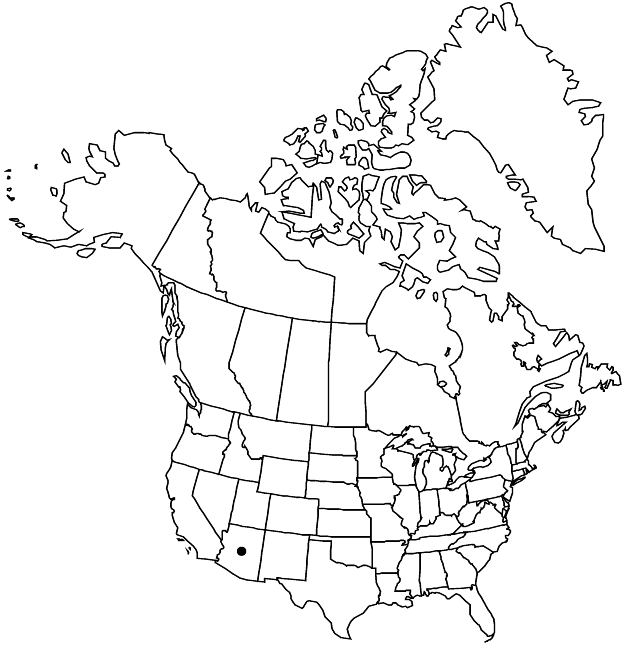Difference between revisions of "Eriogonum arizonicum"
Contr. W. Bot. 11: 16. 1903.
FNA>Volume Importer |
FNA>Volume Importer |
||
| Line 25: | Line 25: | ||
|distribution=Ariz. | |distribution=Ariz. | ||
|discussion=<p>Of conservation concern.</p><!-- | |discussion=<p>Of conservation concern.</p><!-- | ||
| − | --><p>Eriogonum arizonicum is widely distributed in scattered and isolated populations across central Arizona from extreme eastern Mohave and southern Yavapai counties through northern Maricopa County to southern Gila and northern Pinal counties. It rarely is common in any location. Limited field observations suggest that some individuals in a population may be first-year flowering perennials.</p> | + | --><p><i>Eriogonum arizonicum</i> is widely distributed in scattered and isolated populations across central Arizona from extreme eastern Mohave and southern Yavapai counties through northern Maricopa County to southern Gila and northern Pinal counties. It rarely is common in any location. Limited field observations suggest that some individuals in a population may be first-year flowering perennials.</p> |
|tables= | |tables= | ||
|references= | |references= | ||
| Line 49: | Line 49: | ||
|publication year=1903 | |publication year=1903 | ||
|special status= | |special status= | ||
| − | |source xml=https://jpend@bitbucket.org/aafc-mbb/fna-data-curation.git/src/ | + | |source xml=https://jpend@bitbucket.org/aafc-mbb/fna-data-curation.git/src/8f726806613d60c220dc4493de13607dd3150896/coarse_grained_fna_xml/V5/V5_802.xml |
|subfamily=Polygonaceae subfam. Eriogonoideae | |subfamily=Polygonaceae subfam. Eriogonoideae | ||
|genus=Eriogonum | |genus=Eriogonum | ||
Revision as of 17:41, 18 September 2019
Herbs, erect to slightly spreading, perennial, 2.5–5(–6) × 3–8 dm, glabrous, glaucous. Stems: caudex compact to spreading; aerial flowering stems erect, solid, not fistulose, 1–3 dm, glabrous or thinly floccose. Leaves basal, sheathing up stems 0.5–15 cm; petiole (0.5–)1–2.5(–4) cm, densely pilose; blade ovate to rounded, (0.5–)1–2(–2.3) × (0.5–)1–2(–2.5) cm, usually sparsely pilose and grayish to whitish on both surfaces, margins undulate. Inflorescences narrowly cymose, open, 10–35(–40) × 5–20 cm; branches not fistulose, glabrous, glaucous; bracts 3, scalelike, 0.3–0.8(–1) × 0.2–0.8 mm. Peduncles erect, straight, capillary to slender, 0.5–2.5(–3) cm, glabrous. Involucres turbinate, (0.8–)1–1.6(–2) × (0.8–)1–1.2(–1.5) mm, glabrous; teeth 5, erect, 0.3–0.8 mm. Flowers (1.2–)1.5–2.5 mm; perianth yellowish to yellowish red or reddish with greenish or reddish to reddish brown midribs, glabrous; tepals dimorphic, those of outer whorl obovate with slightly enlarged, auriculate bases, those of inner whorl obovate; stamens included, 1–1.5 mm; filaments sparsely pilose proximally or glabrous. Achenes dark brown, 3-gonous, 1.5–2 mm, glabrous.
Phenology: Flowering Mar–Jun and Aug–Nov.
Habitat: Sandy flats and gravelly washes, mixed grassland, saltbush, creosote bush, and mesquite communities
Elevation: 600-1100 m
Discussion
Of conservation concern.
Eriogonum arizonicum is widely distributed in scattered and isolated populations across central Arizona from extreme eastern Mohave and southern Yavapai counties through northern Maricopa County to southern Gila and northern Pinal counties. It rarely is common in any location. Limited field observations suggest that some individuals in a population may be first-year flowering perennials.
Selected References
None.
